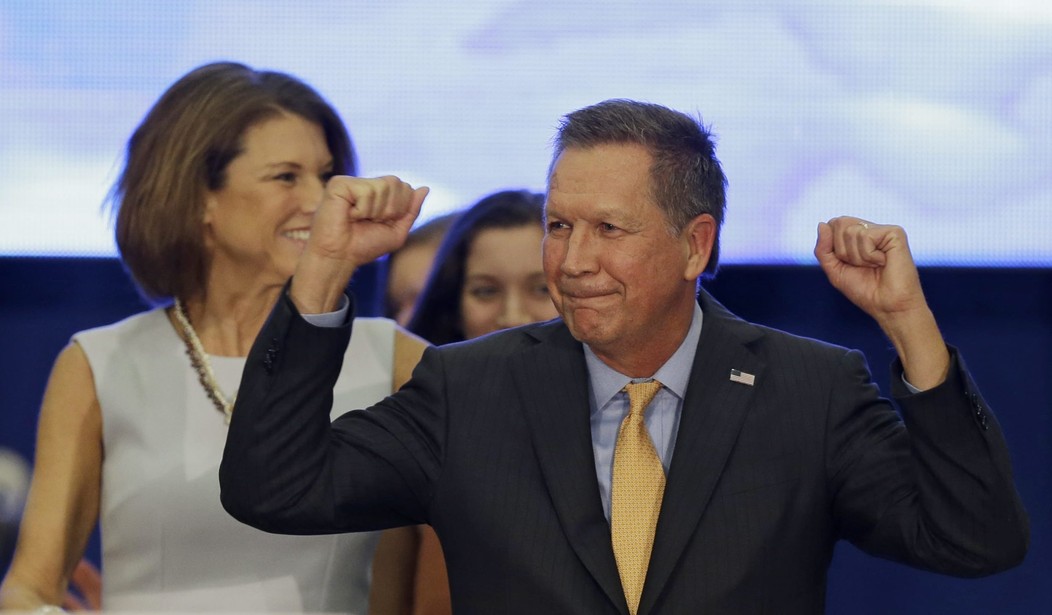John Kasich has begun a new kind of campaign, shooting to convince delegates to the Republican National Convention. His campaign has enlisted two political operatives to this specific task, even while Kasich continues to press the flesh with voters. Cruz’s campaign has also begun targeting unpledged delegates, although it is still possible for the Texas senator to win the nomination outright.
Michael Biundo and Andrew Boucher have been tasked with guiding the Kasich campaign’s efforts in the delegate selection process and with preparing for the July convention in Cleveland, Ohio, the New York Times reported. They will target delegates currently pledged to other candidates, such as Marco Rubio.
While it is mathematically impossible for Kasich to win the nomination outright, Biundo and Boucher might be able to convince enough delegates to vote for the Ohio governor on the second round of voting, should no candidate gain a majority on the first ballot. Kasich’s presidential hopes rest entirely on this scenario.
Biundo served as a senior adviser for Kentucky Senator Rand Paul’s presidential race, and he was the campaign manager for former Pennsylvania Senator Rick Santorum in 2012. Boucher served as national political director for the 2012 Santorum campaign. Both had signed on to advise Kasich, and they built a nation-wide team of operatives.
While Kasich has only won one nominating contest, in his home state of Ohio, general election polls indicate a strong position against Hillary Clinton, the likely Democratic nominee. He holds a 6.5 percent lead on Clinton according to the RealClearPolitics polling average (48.0 percent to Clinton’s 41.5 percent), although Sanders beats him by 2 percent (46.0 percent for Sanders to Kasich’s 44.0 percent). Cruz and Trump both score poorly against Clinton and Sanders in polling.
There is reason to doubt the effectiveness of general election polls this far out. As former Speaker of the House Newt Gingrich pointed out, “Reagan was 25 points behind Carter in March of 1980,” and that polling did little to predict Reagan’s 10-point popular vote victory, carrying 44 states.
Nevertheless, Kasich believes these numbers show him the best suited to face Clinton in November. Kasich spokesman Mike Schrimpf suggested that, as the convention draws closer, “more and more of the delegates are going to focus on who can actually win in November.”
At a town-hall event near La Crosse, Wisconsin, Kasich asked, “What good does it do to win a primary in a narrow way and get your brains beat out in a general if you want to elect a president?”
“We have one person with no political experience at all that says everything’s going to be great,” Kasich added, alluding to Trump. Pivoting to Cruz, he said, “And the other one, let me tell you, the Republican Party and conservative commentators have talked for seven years about electing a first-term United States senator who hadn’t accomplished anything.”
Next Page: Why Kasich’s strategy is fair, and how Cruz is already winning with it.
Ted Cruz, meanwhile, has already adopted this strategy, and picked up ten more delegates than Trump in Louisiana — a state which Trump narrowly won on March 5. Although both Trump and Cruz won 18 delegates that night, Rubio won 5 and 5 remained uncommitted. Cruz’s camp has successfully wooed those remaining 10, prompting Trump to call foul play.
As National Review Editor Rich Lowry explained, “The only scandal here is that the Cruz campaign, built on grassroots organizing muscle, knows the process and is working hard for every advantage.” Trump complaining about Cruz in this situation “is a little like showing up at a cricket match and crying foul because the opposing team knows all the rules and all you know is that you swing a bat.”
Trump has already attacked the exact number of delegates required for the nomination (50 percent plus one, or 1,237 delegates) as “a random number.” This threshold seems arbitrary, but it is not. It demonstrates that the nominee has already become the consensus choice of the party, before the convention.
During most primaries, this hasn’t been an issue. In 2012, Mitt Romney won every single contest after March 24. The runner-up, Rick Santorum, dropped out shortly after losing Wisconsin on April 3, and afterwards, the former Massachusetts governor won most victories with 60 percent of the vote or more.
The same hasn’t exactly happened for Trump so far. If The Donald fails to get 1,237 delegates, that will be a show of weakness on his part. While it may seem unkind to deny him the nomination at the convention, it will not be unfair.
It is also not without precedent for the candidate who wins a majority to be denied victory, in a presidential primary or in the general election. Bush famously won in 2000 despite losing the popular vote (as did Bill Clinton in 1992 and 1996, for the record). Hillary Clinton won the most votes in the 2008 Democratic primaries (since Obama’s name didn’t even appear on Michigan ballots), but she still lost the primary.
The strategy adopted by Kasich and Cruz — wooing unpledged delegates or trying to become their second-choice candidate — is completely fair, and rather than complain, Trump should get on the bandwagon.









Join the conversation as a VIP Member